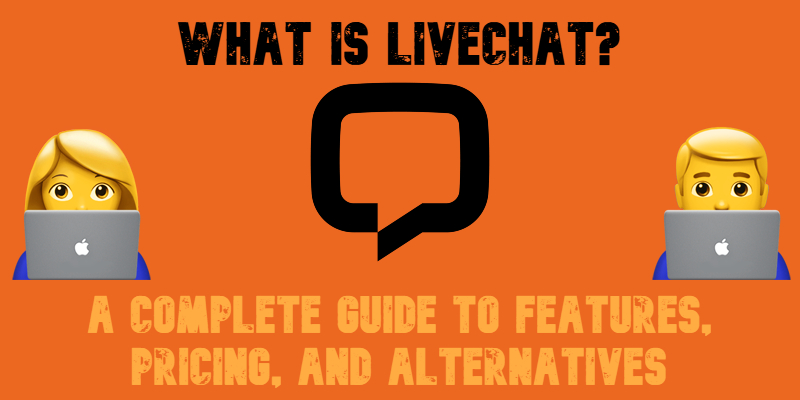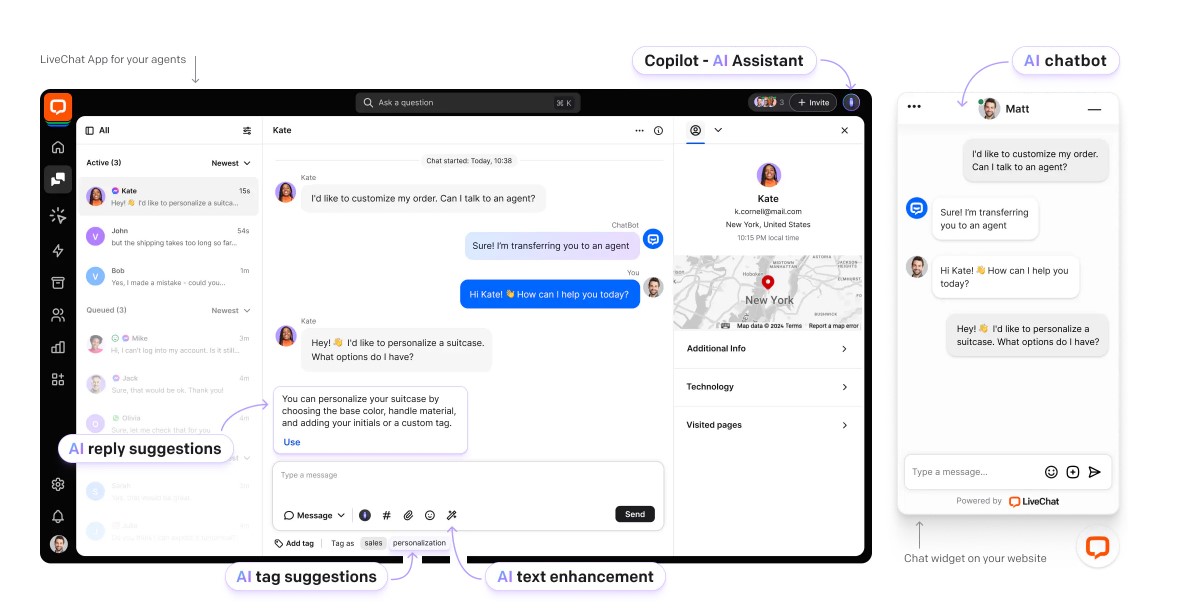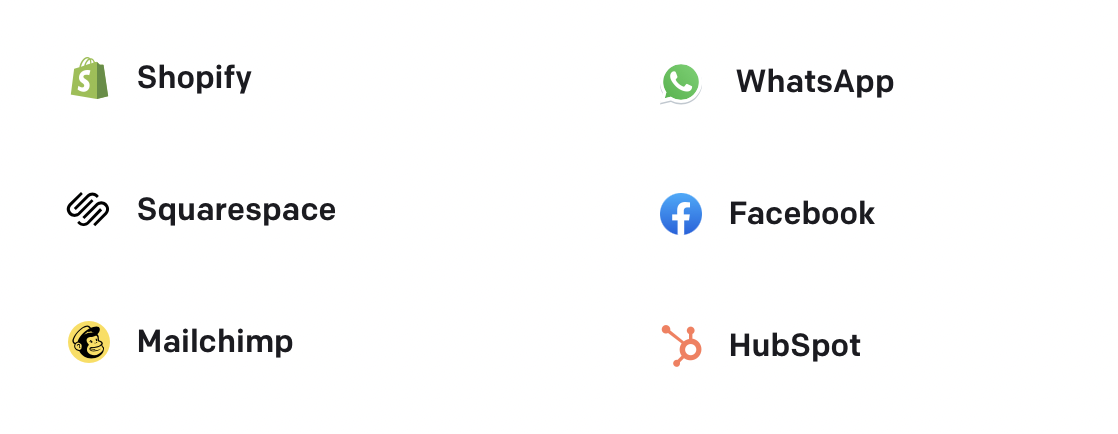What is LiveChat? A 2026 Guide to LiveChat AI, Features, Pricing, and Alternatives

LiveChat is more than just a chat widget — it’s a powerful customer support and sales platform designed to help businesses connect with their audience in real time. Whether you’re running an e-commerce store or a service-based company, providing instant support can significantly boost customer satisfaction and conversion rates.
With advanced features like AI automation, personalized messaging, and seamless integration across websites and mobile apps, LiveChat has evolved into a complete customer communication solution.
In this article, we’ll explore what LiveChat is, how its AI capabilities enhance efficiency, the different LiveChat pricing plans, and the best LiveChat alternatives available in 2026. We’ll also help you decide whether LiveChat is still the right tool for your business in today’s competitive market. By the end, you’ll know if this platform is truly worth using in 2026 for support, engagement, and growth. Let’s elevate your customer support — explore how LiveChat fits into the best AI tools for engagement.

Table of contents
- What Is LiveChat? AI-Powered Customer Service
- LiveChat Features and Functionalities: What Makes It a Powerful Customer Service Platform
- LiveChat AI Features: Smarter Customer Support in 2026
- LiveChat Integrations: Connect Your Entire Tech Stack
- LiveChat Pricing Plans: Which Tier Is Right for You?
- Final Verdict: Is LiveChat Worth It in 2026?
- Frequently Asked Questions About LiveChat
What Is LiveChat? AI-Powered Customer Service
LiveChat is a modern customer communication platform designed to help businesses engage with their customers in real time through a chat widget embedded on websites and mobile apps. As of 2026, it has evolved far beyond traditional live chat, integrating advanced AI capabilities and automation tools to support, market to, and convert users more effectively.
At its core, LiveChat allows companies to offer immediate responses to customer inquiries, improving satisfaction, loyalty, and trust. But its true strength lies in its rich set of features that streamline customer service workflows and elevate user experience. Teams can route chats to specific agents, set up automated greetings or responses using customizable triggers, and access detailed analytics to track performance and customer behavior.
With the addition of LiveChat AI, the platform now provides intelligent response suggestions, automatic conversation summaries, intent detection, and AI-enhanced routing, allowing businesses to resolve issues faster while freeing up support agents for more complex tasks. This blend of human support and machine learning ensures consistency, personalization, and scale.
LiveChat is accessible across desktop and mobile devices, making it easy for support teams to manage conversations from anywhere. Whether you’re running a fast-growing startup or managing customer service for a large enterprise, LiveChat’s AI-powered features, scalability, and seamless integration with popular platforms like Shopify, WordPress, and HubSpot make it a must-have tool for improving communication, optimizing support operations, and increasing conversion rates in 2026.
If you’re searching for a platform that combines real-time engagement with powerful automation, LiveChat offers an all-in-one solution — and it’s worth exploring whether it fits your business needs this year.
LiveChat Features and Functionalities: What Makes It a Powerful Customer Service Platform

LiveChat is not just a simple messaging tool — it’s a robust customer service solution packed with features designed to help businesses deliver fast, personalized, and efficient support. From real-time conversations to advanced visitor insights, the platform equips companies with everything they need to build better customer relationships and boost conversions.
Real-Time Chat That Drives Customer Satisfaction
At the heart of LiveChat is its real-time messaging interface, allowing agents to respond instantly to customer queries. This immediacy improves user experience, reduces response time, and increases customer satisfaction — critical factors for businesses aiming to retain loyal customers in 2026.
Fully Customizable Chat Widgets
LiveChat offers a wide range of customization options for chat windows, enabling businesses to align the look and feel of their widgets with their branding. You can adjust colors, positioning, and even greetings to create a seamless experience that feels native to your site or mobile app.
Smart Visitor Tracking and Engagement
LiveChat includes built-in visitor tracking tools that show exactly who is browsing your website, which pages they’re visiting, and how long they stay. This data allows businesses to proactively reach out to high-intent visitors with tailored messages, improving engagement and increasing the chances of conversion.
Canned Responses and Chat Tags for Agent Efficiency
Support teams can leverage canned responses for commonly asked questions and use chat tags to categorize interactions. These features help streamline workflows, improve response consistency, and reduce repetitive typing — ideal for fast-paced support environments.
Easy File Sharing and Multimedia Support
Agents and customers can exchange images, documents, and other files directly through the chat window. Whether it’s a product screenshot, a troubleshooting guide, or a contract, this file sharing functionality makes complex conversations smoother and more productive.
Offline Messaging and Ticketing
When agents are unavailable, LiveChat automatically switches to offline messaging mode, allowing users to leave questions that convert into support tickets. This ensures no customer inquiry goes unanswered, even outside business hours.
Seamless Integration With Popular Business Tools
LiveChat integrates effortlessly with platforms like Shopify, Magento, WordPress, Slack, HubSpot, and Salesforce, making it easy to connect with the rest of your sales, marketing, and customer service stack. These integrations save time, centralize communication, and improve team coordination.
Multi-Channel Access and Mobile App
With LiveChat’s mobile application for iOS and Android, your support team can stay connected to customers from anywhere. Plus, the platform supports omnichannel messaging, so you can manage conversations from Facebook Messenger, WhatsApp, and other platforms in one unified dashboard. Watch this video for further information:
As you can see, LiveChat’s rich feature set can empower businesses to deliver faster, smarter, and more consistent support across every channel. But what really sets LiveChat apart in 2026 is its AI-powered capabilities — from intelligent routing to real-time agent suggestions. In the next section, we’ll dive into how LiveChat AI is revolutionizing customer service and helping businesses scale their support without sacrificing quality.
LiveChat AI Features: Smarter Customer Support in 2026
LiveChat AI is redefining the way businesses handle customer support in 2026. More than just a buzzword, the platform’s built-in AI tools are designed to streamline daily operations, reduce manual workloads, and deliver faster, more consistent service — all while maintaining a human touch.

Let’s take a closer look at the most powerful AI-driven features built into LiveChat and how they improve customer support workflows:
🧠 AI Suggestions for Faster Responses
One of the standout features of LiveChat AI is its real-time reply suggestions. As agents engage with customers, AI analyzes the conversation and instantly offers context-aware responses. This not only speeds up response time but also reduces cognitive load for support agents — allowing them to maintain tone consistency and accuracy even during peak hours.
🎯 Intent Detection & Smart Routing
LiveChat AI is capable of detecting customer intent based on the language and tone used in the chat. Whether a visitor is looking to make a purchase, request a refund, or report a technical issue, the system can route the chat to the most appropriate department or agent — automatically. This smart routing improves first-contact resolution rates and ensures customers don’t waste time being transferred between departments.
📝 AI-Powered Conversation Summaries
After a chat session ends, LiveChat AI automatically generates a summary of the conversation. This recap highlights key points and resolutions, helping agents document interactions without writing lengthy notes. It also supports future follow-ups and helps team leads track issue types and outcomes more efficiently.
🔁 Automated Chat Workflows
LiveChat supports AI-driven automation flows, which allow businesses to handle repetitive tasks without involving a human agent. For example, answering FAQs, booking appointments, or gathering lead information can all be managed by the AI assistant, freeing up human agents for more complex inquiries.
🧩 Seamless Integration With AI Chatbots
The platform also integrates with LiveChat’s AI chatbot system, enabling fully automated conversations that feel human. Businesses can configure chatbots to match their tone of voice, solve basic issues, recommend products, and even escalate chats when needed. This balance between AI and human agents helps scale support operations without losing quality. Watch this tutorial for more information:
By embedding AI into everyday tasks, LiveChat AI empowers support teams to be faster, smarter, and more efficient. From conversation summaries to intent-driven routing, these features not only reduce manual workloads but also enhance the customer experience by providing instant, intelligent assistance.
LiveChat Integrations: Connect Your Entire Tech Stack

One of LiveChat’s greatest strengths in 2026 is its ability to seamlessly integrate with dozens of essential business tools, allowing companies to create a unified customer service and sales ecosystem. Whether you’re running a small eCommerce site or managing a large enterprise support operation, LiveChat’s extensive integration capabilities help centralize workflows, streamline communication, and unlock powerful automation opportunities.
Below are some of the most impactful LiveChat integrations that empower businesses to deliver fast, consistent, and context-rich customer support:
🔄 CRM Integrations: Manage Customer Data in One Place
LiveChat connects effortlessly with leading CRM platforms like Salesforce, HubSpot, and Zendesk Sell, enabling support agents to view and update customer records without switching tools. This integration ensures every customer interaction is logged, traceable, and personalized — crucial for maintaining high-quality service across multiple touchpoints.
🛒 eCommerce Integrations: Support That Drives Sales
For online stores, LiveChat integrates directly with eCommerce platforms like Shopify, BigCommerce, and WooCommerce. This gives agents immediate access to customer order history, cart contents, and browsing behavior, allowing them to provide personalized product recommendations, troubleshoot order issues, and close sales — all in real time.
💬 Social Media Integrations: Engage Customers Where They Are
With built-in integrations for platforms like Facebook Messenger, Instagram, and Twitter, LiveChat lets businesses manage conversations from multiple social media channels within a single dashboard. This means your team can respond instantly to customer inquiries, complaints, or product questions, no matter where they originate.
📈 Marketing Tools: Turn Support Into a Growth Channel
By integrating LiveChat with Google Analytics, Mailchimp, ActiveCampaign, and other marketing tools, businesses can track the performance of their chat interactions, segment users, and launch targeted follow-up campaigns. These integrations help transform live conversations into actionable data and nurture customer relationships beyond the chat window.
🎫 Help Desk and Ticketing Systems: Centralized Support Workflow
LiveChat also integrates with popular helpdesk software like Freshdesk, Help Scout, and Zendesk Support, allowing teams to escalate chats into support tickets when needed. This creates a smooth handoff between live support and asynchronous ticket management, ensuring no customer issue falls through the cracks.
🔧 Developer Tools and Custom Integrations
For teams with unique workflows, LiveChat offers API access and integration with Zapier, allowing developers to create custom automations or connect with virtually any third-party system. This flexibility makes it a future-proof solution for businesses that expect to scale or adapt their tech stack.
The power of LiveChat lies not only in its real-time communication capabilities but also in its ability to work as part of your larger digital ecosystem. By integrating with CRMs, eCommerce platforms, social media channels, and marketing automation tools, LiveChat becomes a central hub for customer engagement, support efficiency, and business growth.
Next, let’s break down LiveChat’s pricing plans so you can choose the best option for your team and budget.
LiveChat Pricing Plans: Which Tier Is Right for You?
Choosing the right LiveChat pricing plan depends on the size of your team, the volume of customer interactions you handle, and the level of customization or reporting you need. In 2026, LiveChat offers four tailored pricing tiers — each designed to meet the specific needs of businesses at different growth stages, from solo entrepreneurs to global enterprises.
Let’s explore what each plan offers and who it’s best suited for.

Starter Plan – Built for Solo Entrepreneurs and Small Teams
Priced at $20/month per user (billed annually), the Starter plan is ideal for individuals or small businesses just beginning to offer live customer support. It includes essential features like real-time chat, Text Intelligence, and the ability to track up to 100 visitors. You’ll also get one recurring campaign, basic widget customization to match your branding, and a 60-day chat history — perfect for managing short-term customer records. With 24/7/365 support from LiveChat, even solo users are never left on their own. If you’re just getting started and want an easy, reliable way to chat with customers, this plan provides solid value.
Team Plan – Designed for Growing Support Teams
At $41/month per user (billed annually), the Team plan expands on everything in the Starter tier and unlocks more power for full-time support teams. Visitor tracking scales up to 400 people, campaigns become unlimited, and your chat history is no longer limited — enabling full visibility into past conversations. You also gain access to full widget customization, basic reporting tools, and support for an unlimited number of users, making it ideal for companies scaling their customer service operations. If you’re handling a moderate to high volume of daily inquiries and want to unify your team under one dashboard, the Team plan hits the sweet spot.
Business Plan – Tailored for Customer Service Departments
The Business plan, priced at $59/month per user (billed annually), is built for high-performance support operations with advanced staffing and reporting needs. You get everything in the Team plan, plus sophisticated tools like a work scheduler, staffing predictions, on-demand reporting, and agent performance analytics. Tracking capacity increases to 1,000 website visitors, and LiveChat opens communication channels like SMS and Apple Messages for Business. If your team is managing structured shifts, needs insight into peak traffic periods, or relies on performance-based KPIs, this tier provides the control and data you need to operate efficiently.
Enterprise Plan – For Global Brands with Complex Needs
The Enterprise tier is custom-priced and built to support global companies with advanced compliance, branding, and operational requirements. In addition to everything in the Business plan, Enterprise users benefit from custom tracking limits, white-label chat widgets, Single Sign-On (SSO), and HIPAA compliance — critical for industries like healthcare and finance. A dedicated account manager, onboarding assistance, and even access to a LiveChat software engineer ensure a smooth rollout and continued technical support. Flexible billing and alternative payment terms are available as well. If you’re running a global operation and need full customization and compliance, Enterprise delivers maximum value.
Whether you’re just getting started or managing thousands of conversations a day, LiveChat’s pricing structure is designed to scale with your business. Each tier includes access to LiveChat’s core features, seamless platform integrations, and — at every level — AI capabilities that elevate your team’s efficiency.
Next, we’ll compare LiveChat alternatives worth considering in 2026 to help you choose the best fit for your customer service strategy.
LiveChat Alternatives: Better Options for Your Budget, Usability, or AI Needs?
While LiveChat remains one of the most popular customer service platforms in 2026, it’s not the only option out there. Depending on your business goals and priorities — whether it’s cost-effectiveness, ease of use, or access to advanced AI features — several powerful LiveChat alternatives may be a better fit.
Let’s explore three noteworthy options based on different needs.
💸 Tidio – The Best Budget-Friendly LiveChat Alternative
![]()
If affordability is your top priority, Tidio offers a solid mix of live chat and chatbot functionality at a fraction of the price. Tidio’s free plan includes basic live chat features and chatbot flows for small businesses, while its paid plans start as low as $29/month — significantly more budget-friendly than LiveChat’s Starter tier. Despite its lower cost, Tidio still delivers core features like real-time visitor tracking, customizable widgets, and email integration, making it ideal for startups and lean teams.
Best for: Small businesses and solopreneurs looking for affordable live chat with basic automation.
🧩 Olark – The Most User-Friendly LiveChat Alternative
![]()
For businesses seeking a streamlined, intuitive interface, Olark stands out as one of the most user-friendly live chat solutions on the market. Its clean dashboard, simple customization tools, and real-time chat analytics make it incredibly easy to use — even for non-technical teams. While it doesn’t offer deep AI functionality, Olark excels in simplicity and reliability, with a flat-rate pricing model that’s easy to scale.
Best for: Teams that value usability, clarity, and a low learning curve over advanced automation.
🤖 Intercom – The Most Feature-Rich and AI-Powered LiveChat Alternative
![]()
If you’re looking for a LiveChat alternative with more features and powerful AI, Intercom is the clear winner. In 2026, Intercom offers an AI-first approach to customer communication with tools like Fin, its generative AI chatbot, which can resolve up to 50% of support queries on its own. Combined with proactive messaging, behavioral triggers, multi-channel support, and deep CRM integration, Intercom is built for businesses that want to automate, personalize, and scale support effortlessly.
Best for: Mid-size to enterprise businesses needing robust AI tools and a complete customer engagement platform.
Whether you’re on a tight budget, need a no-fuss interface, or want next-gen AI support, these LiveChat alternatives offer powerful value in their own right. The right choice depends on your business goals, team size, and customer experience strategy.
Next, let’s wrap things up with a final verdict — is LiveChat still worth it in 2026?
Final Verdict: Is LiveChat Worth It in 2026?
After exploring its real-time chat functionality, robust integration options, and growing suite of AI features, it’s clear that LiveChat remains a strong contender in the customer service software space in 2026. Designed to meet the evolving needs of modern eCommerce, SaaS, and service-based businesses, LiveChat helps organizations deliver faster, smarter, and more personalized support at scale.
The platform’s strengths lie in its ability to unify support across multiple channels while offering features like visitor tracking, customizable chat widgets, performance analytics, and seamless integrations with CRM, eCommerce, marketing, and helpdesk tools. And with the addition of LiveChat AI, businesses can now automate routine tasks, improve agent productivity, and elevate the customer experience with intelligent response suggestions and conversation summaries.
However, LiveChat may not be ideal for businesses that rely heavily on voice or in-person communication. Additionally, teams new to live chat platforms might face a slight learning curve, especially when configuring advanced features or integrating with external systems. Internet dependency is another factor to consider, particularly for businesses operating in regions with unstable connectivity.
✅ Pros:
- Real-time customer communication improves satisfaction and loyalty
- Easy integration with Shopify, HubSpot, Salesforce, and more
- AI tools that streamline workflows and reduce response time
- Advanced analytics and customizable widgets
- Scalable pricing plans for teams of all sizes
❌ Cons:
- Limited to online channels — no native voice or video support
- Some features may require onboarding or training
- Relies entirely on a stable internet connection
So, is LiveChat still worth using?
Absolutely — especially if your goal is to streamline customer support, boost conversions, and leverage AI to scale operations without sacrificing quality. Whether you’re a solo entrepreneur or a global enterprise, LiveChat offers the tools, intelligence, and flexibility to meet modern support demands. We recommend trying it firsthand to fully explore its capabilities and see how it aligns with your business needs.
Frequently Asked Questions About LiveChat
What is LiveChat and how does it work?
LiveChat is a customer service platform that allows businesses to chat with visitors in real time through a website or mobile app widget. It enables instant communication between support agents and customers, improving satisfaction and increasing conversion rates.
Does LiveChat offer AI features?
Yes, LiveChat includes AI features such as real-time response suggestions, conversation summaries, customer intent recognition, and smart routing. These tools help automate support tasks and improve agent productivity.
How much does LiveChat cost in 2026?
LiveChat pricing starts at $20 per month per user (billed annually) for the Starter plan. The Team plan costs $41, the Business plan is $59, and the Enterprise plan offers custom pricing with additional services and compliance options.
Is LiveChat good for eCommerce businesses?
Absolutely. LiveChat is well-suited for eCommerce platforms like Shopify, WooCommerce, and BigCommerce. It lets agents view customer data, provide product recommendations, and support shoppers in real time.
Can LiveChat be integrated with other tools?
Yes, LiveChat integrates with CRMs like Salesforce and HubSpot, marketing tools like Mailchimp and Google Analytics, helpdesks like Zendesk and Freshdesk, and social channels like Facebook Messenger.
What makes LiveChat different from other live chat tools?
LiveChat stands out for its strong mix of real-time communication, AI-powered automation, rich customization, and easy integration with a wide range of platforms. It’s also scalable for businesses of all sizes.
Does LiveChat offer mobile access?
Yes, LiveChat has mobile apps for iOS and Android, allowing agents to handle conversations and stay connected with customers from anywhere.
Is LiveChat suitable for enterprise use?
Yes, the Enterprise plan is built for global companies. It includes advanced features like HIPAA compliance, white-label customization, SSO, and access to a dedicated account manager and software engineer.
What are the best LiveChat alternatives in 2026?
Some top alternatives include Tidio (more budget-friendly), Olark (simpler to use), and Intercom (more advanced AI features). Each has its own strengths depending on your business goals.
Can I use LiveChat without technical skills?
Yes, LiveChat is beginner-friendly. It’s easy to install and manage without coding, offering a user-friendly interface and drag-and-drop customization for non-technical users.









